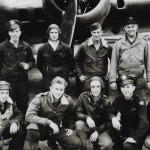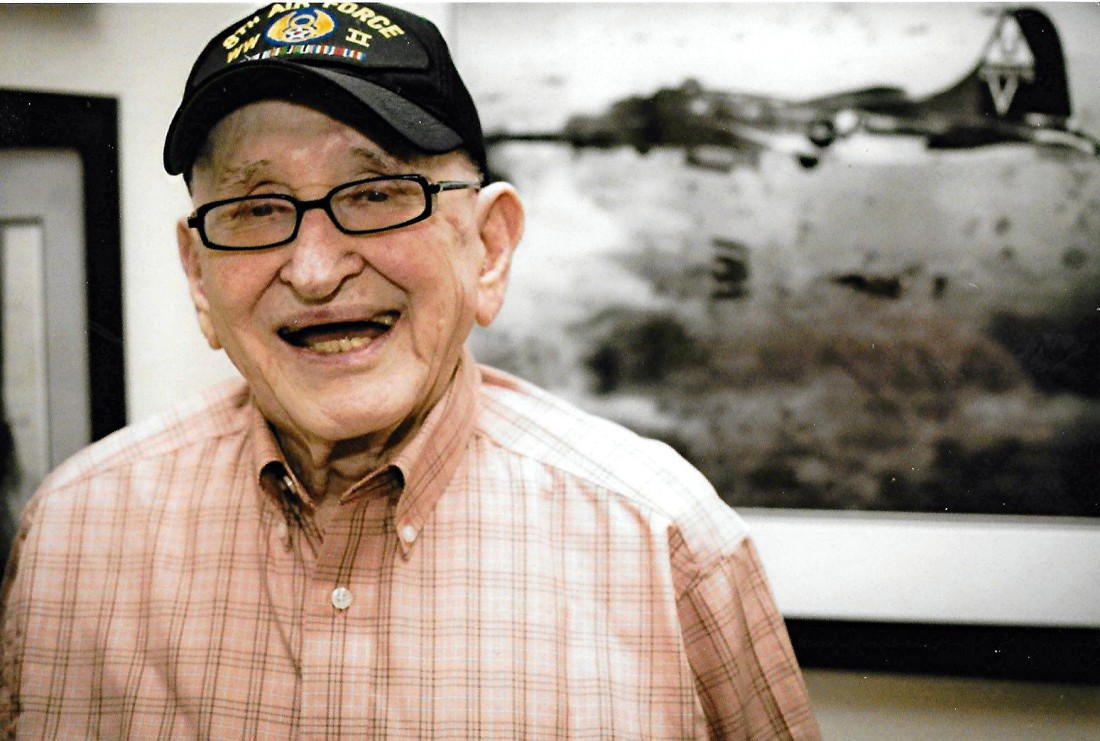BY JOE ELLIOTT
Retired U.S. Army Col. John Bennie Parker vividly remembers the moment he first heard the words “Pearl Harbor.” Parker, who now resides at the State Veterans Home in Black Mountain, was an 18-year-old student at Kansas State University in December 1941. His father, an Army chaplain at nearby Fort Riley, had invited John and his three brothers home for dinner that Sunday. Chaplain Parker took his family out for a spin in his new Plymouth, and when they stopped to get gas, the attendant asked the minister what he thought about Pearl Harbor.
“Who’s she?” asked the chaplain. Like millions of other Americans, the Parkers would soon learn more than they ever wanted to know about the Hawaiian naval base, the site of an aerial attack that morning by the Japanese navy that brought America into the Second World War.
The following day, John Parker went down to the nearest recruiting office to enlist. However, he was told that he must first have written permission from his parents, which his father refused to grant.
“He made a deal with me,” Parker recalls. “He said if I would finish out my semester at Kansas State, he would sign for me, which is what happened.” After enlisting, he was sent to Fort Leavenworth for training, then on to Camp Hood (later Fort Hood), located halfway between Austin and Waco, Texas. Hood was still under construction at the time, and conditions were primitive. Because he could type, Parker got a job as a company clerk, a position that eventually earned him his first two stripes and a $9 increase in his monthly GI pay.
Shortly afterward, Parker completed pilot training but was switched to navigator. “I was told that because I’d been a business major in college I had to train as a navigator, because all business majors that month were being appointed navigators,” he recalls. He got his wings in April 1944, at which point he started B-17 squadron training.
Parker was eventually assigned to the 457th Bombardment Group, an 8th Air Force B-17 Flying Fortress unit. His squadron, the 749th, was led by a man named Dick Hedrick. In July 1944, the 457th received word that they’d be shipping out to Nebraska, where a number of brand-new silver B-17s were housed. Parker, now a lieutenant, and his crew were later told they’d be heading to England, but they didn’t know for what purpose or even by what route.
As his group’s navigator, it would be up to him to get them there. “I didn’t like that at all,” he says. “I didn’t know if I had enough training and skill to navigate a plane that far. We had to fly at night to reduce the risk of attack. I told Dick Hedrick I had almost no celestial training. He told me, ‘Well, John, you’re the best we’ve got, and you’re our navigator,’ and that was that. You couldn’t fly in formation because you used too much gas, so it was just us. We had to time it so we would land at first light in Scotland, a 10 1/2-hour flight. I was scared to death.”
But when, hours later, Parker spotted the curve of Scotland looming out of the semidarkness, he knew they’d made it. “I hit it right on the nose,” he recalls with a smile. ‘Wow, I’m a navigator,’ I said to myself. Boy, I felt great. I thought we were going to win this war all by ourselves.”
Upon returning from breakfast a little later that morning, however, Parker and his crew got a rude awakening when they found their shiny new B-17 missing and, in its place, a stack of luggage. “I asked the sergeant in charge where was our airplane. ‘Your airplane?’ he said. ‘You don’t have an airplane. Do you really think they would trust a new 17G to a bunch of rookies like you? Why, you guys will be dead in three days.’ ‘Thanks a lot,’ I said.”
Later they traveled to a camp in northern England, where they stayed for a week, all the while dodging the buzz bombs [V-1 flying bombs] the Germans were regularly hurling at the beleaguered island nation. “We eventually went by train to join the 457th Bombardment Group,” Parker explains. “There were 40 bomb groups in England at that time. Fortunately, I was assigned to the 749, Dick Hedrick’s group. When we went to briefing, we never knew for sure where the mission would be for that day. They would wake us up around 3:30 in the morning, and the sergeant from operations would tap me on the toe, saying, ‘Get up, lieutenant, and go act like a hero.’”

“The Battle of the Bulge began on Dec. 16, and by that time we owned the sky. However, Adolf Hitler had a plan to build a new army,” continues Parker. “By this time he had two types of jets, the first of their kind in history. The jets were hidden from the Allies at the edge of the Ardennes forest in the region of Belgium and Luxembourg. Hitler’s weather experts said a system was coming in the week of the 18th, and there would be no visibility and no ceiling. If he wanted to move his army, he would need to do it during those five or six days, which is what he did.
“When we went out our front door on the 18th, we couldn’t see 50 feet in front of us; the visibility wasn’t even a quarter of a mile. We sat in the nose of the airplane for about four hours, just waiting for it to open up enough so we could get across the English Channel and go do some damage. It didn’t happen. The next day the same thing. A lot of Allied soldiers were dying in the meantime, so we couldn’t wait to get off the ground, along with the P-51s and P-47s.
“Finally, on the morning of Christmas Eve, we led the high squadron. There were 40 B-17 groups taking off and that many B-24 groups. Our mission that day was to bomb the railroad yards at Koblenz, Germany. If we could get over there, we could be back in five or six hours. Well, we flew up to the wash and checked our guns before flying back over our base to await the rest of the planes in our group to get in the air. We went round and round, but nothing happened. We only had six airplanes in the air instead of the 36 we needed. What we didn’t know was that the seventh airplane had dragged its wing on takeoff, killing everybody on board. It blew such a hole in the runway that no one else could take off. Then came the message over our headsets: ‘Go to war.’
“Dick Hedrick, tapping his headset, looked at me and asked me what he said. I said he told us to go to war. ‘With six airplanes?’ Hedrick asked. ‘We can’t go to war with six airplanes. I told him he would have to make the decision himself, and he did. When we got to the rail yards, we knocked the hell out of them with only six airplanes.”
After the bombing run, Parker and the other crew members were anxious to get back to base to celebrate what was left of Christmas Eve. “We all got cookies from home,” he recalls. “Our captain would also get cookies but save his and eat ours first. So we couldn’t hardly wait to get back to our base and help our leader eat his stuff. As we approached our base, we received a warning that there was a bogey at 12 o’clock high. I looked up and saw a jet stream where a jet stream cannot be. We were at 26,000 feet, and this thing had to be at least 40,000 feet.
“‘This can’t be,’ I said to myself. However, it was heading right at us and was firing 20mm cannon on a [prototype] twin-engine jet. How he missed us, I don’t know. However, he went past us and couldn’t turn because of the jet engines. Our P-51s shot him down. None of us at the time knew we were seeing a jet.
“When we got back, the base commander met us. ‘You people today have seen things that nobody has ever seen before,’” he told us. He then invited us to join him for Christmas Eve dinner. When we got there, half of the roof was bombed out, but it didn’t matter: We had a cot to sleep on, and I guess we had a few drinks that night.”
Joe Elliott is a writer and educator who lives in Buncombe County.




This is a fascinating story of the WWII experiences of Col John Bennie Parker. Then, he daily put his life on the line . Now we too commonly refer to anyone who completed some barely challenging task as a hero. True heroes like Col Parker did what they were called on to do, with the risk be damned. He knew what he was fighting for and he lived to tell the tale. Col Parker has earned every American’s respect and gratitude.
Colonel Parker… I was a 1st Lt. Bombardier at war’s end, 20 years old, went back to college. Served in the 487th B.G. at Lavenham. That Christmas Eve mission you were talking about was our 6th and the 487th was leading the 8th AF with General Castle in command. He had only been a General for 10 days. Our low group was hit by more than 30 FW190’s near the Rhine River. We lost ten B17s , and numerous men killed including the General. The rest of us went on (don’t remember ever turning back due to losses) and bombed a German airfield at Babenhausen. Finished my 35 missions and was back in the U.S. before the war in Germany was over. You were right about it being an unforgettable Christmas Eve.